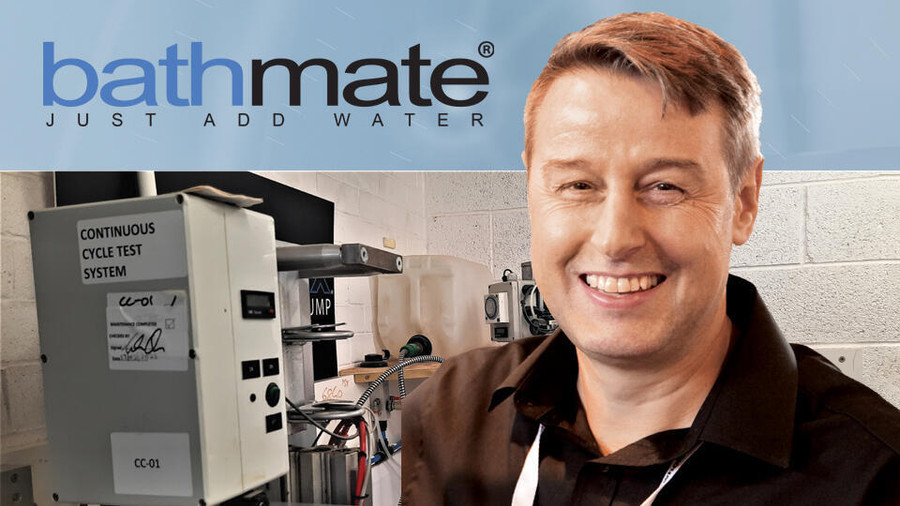Like most products claiming to increase penis size, penis pumps have long been viewed as part of the gimmicky, novelty side of the pleasure products space. The Brits at Bathmate, however, find this dismissive attitude about as laughable as a bachelor party blow-up doll — and possibly even downright irresponsible.
Since the company’s inception in 2006, Bathmate has delivered myriad iterations of the brand’s namesake: a hydrotherapy pump utilizing warm water and suction to take advantage of the penis’s naturally hydraulic erectile function.
At Bathmate, regulatory compliance is a full-time job.
Founder John Oakes, a mechanical engineer, developed the Bathmate penis pump to operate as, to quote the company’s training script, “a gym workout for your penis.” For men with erectile dysfunction or a simple desire for more length and girth, the Bathmate promises results with daily use, just like any other physical exercise routine.
Bathmate contends that it has maintained high standards from the beginning. However, the company is now arguing for standardized regulation of penis enlargement products.
Tim Brown, global brand manager for Bathmate, says the company’s water-powered penis pumps — and all penis pumps, for that matter — technically fall into a product category above and beyond adult novelty: medical devices. That is because they “affect the structure or any function of the body,” as FDA regulations specify for inclusion in that category.
“They are commonly used to treat erectile dysfunction,” explains Brown, who leads global sales and compliance at Bathmate. “More specifically, penis pumps are what the FDA calls ‘external penile rigidity devices,’ as they are used to create or maintain an erection for sexual intercourse. The FDA says constriction rings that restrict venous blood flow leaving the penis during sex are also external penile rigidity devices.”
Brown clarifies that since penis pumps and constriction rings present certain risks to consumers, ranging from injury due to deficient design to aggravation of existing medical conditions by misuse, the FDA classifies these products as Class II medical devices. Therefore, companies that manufacture and sell penis pumps and construction rings must follow FDA design and manufacturing specifications and labeling requirements, to ensure safe and effective products.
“We want to stand out above the competition,” acknowledges Brown. “There are so many other pumps on the market. We feel if you are going to put your penis anywhere, it should be well looked after and safe, which is the reason we go the extra mile.”
In case Bathmate’s B2B partners think the company’s recent advocacy in this area means that it has only just begun to follow medical device regulations, Brown clarifies, the opposite is true.
“There’s nothing new about Bathmate quality or standards,” states Brown. “We have always manufactured to a high standard and have the accolades and certification to prove it. However, we are always looking at better ways to manufacture our products, so occasionally the production process does change to improve the products and be more environmentally friendly.”
Brown adds that Bathmate has been an FDA-registered establishment for years, with every single product appropriately listed in the FDA’s database, and that the company also holds International Organization for Standardization (ISO) certification for the brand’s medical device quality management system and manufacturing processes. He also emphasizes that the company’s U.K. manufacturing facility is routinely inspected for quality control and assurance systems, pressure testing, the traceability of individual parts and completed product assemblies, and even customer-facing policies.
“These intensive week-long inspections make us a better company, and when coupled with a superior product, set us apart from the rest,” says Brown.
As usual, navigating through red tape doesn’t come cheap. Meeting compliance obligations is a pricey way of doing business, but one that Bathmate sees as well worth the cost.
“At Bathmate, regulatory compliance is a full-time job,” Brown affirms. “Really! We have retained two outside FDA consulting firms and we even have one employee whose entire job is dedicated to implementing our compliance program.”
Fortunately, Brown says, meeting the highest standards on one continent makes it easier to comply with the rest of the world’s regulations.
“The U.S. has generally stricter standards,” explains Brown. “So if our products are compliant with U.S. law, then they generally comply globally or they require minimum changes.”
In the end, Brown notes, the whole point of understanding and complying with governmental legalese is consumer safety and product efficacy.
“This is actually the most important part of FDA registration,” says Brown. “It ensures that these medical devices incorporate design features that mitigate risk of injury and are safe and effective when used as directed.”
Brown advises any penis pump manufacturing outfit that can’t answer a few questions from the FDA to get schooled and shape up before they come knocking. Those involved in the design and manufacturing process, he points out, need to understand complex anatomical and engineering knowledge, such as the safety limit for a body under pressure, the pressure created by the pumps a company manufactures or imports and what happens to the body when safe pressure limits are exceeded. Brown hopes to rally the industry around caring for consumers.
“I think we can all agree that registering with the FDA and manufacturing safe and effective products that are fully traceable is a goal every company should aspire to,” Brown says. “Perhaps that’s one of the reasons why Bathmate pumps are the highest-quality penis pumps in the world,” he concludes with a grin.








